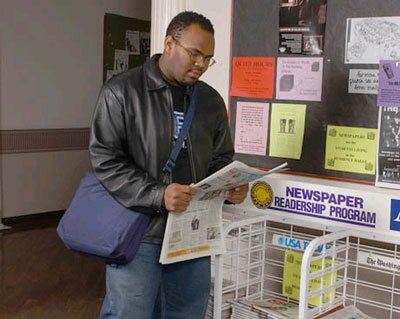 |
 |
 |
|
|
||||||||||||
|
|
||||||||||||
| Email Article | Printable Page |
Tennessee State Ends Free Newspaper Program
 |
|
Photo credit: USA Today Collegiate Readership Program
American University in Washington is one of 350 schools participating in the Collegiate Readership Program. Nine are historically black colleges or universities.
|
As the newspaper industry struggles to attract younger readers, a program that provides newspapers at no cost to students in Tennessee State University residence halls has ended because the university says it can no longer afford them.
USA Today's Collegiate Readership Program, which supplies USA Today, the Wall Street Journal and the Nashville Tennessean to seven dormitories, was scrapped this year.
"If someone would have given me more money to fund it, I would have loved to expand the program in the future," Peggy Earnest, dean of housing, said. "But we don't have enough money to fund it this year."
The program, which had been in operation for four years, cost the university $10,741.50 last academic school year, according to Larry Carpenter, assistant director of housing. But Earnest said the program will be brought back only "if money permits."
Nationally, the Collegiate Readership Program started in 1997 at Penn State University. Its goal is to enhance students' view of the world, said Douglas Fraser, the program's director.
"We're sorry that Tennessee State students aren't taking advantage of that program," said Fraser, who is USA Today education manager, national education programs. "The program, once it's in place, is usually successful." He said Tennessee State "is not alone, but is one of the few" to discontinue it.
As of March, nine of the 350 schools participating were historically black colleges or universities. In addition to Tennessee State, they were Wiley and Bethune-Cookman colleges and Alabama A&M, Delaware State, Elizabeth City State, Florida A&M, Grambling State and Norfolk State universities.
"I used to take full advantage of the program last year when I stayed in Rudolph" Residence Center, said Marquita Ector, a senior fashion design major from Chattanooga, Tenn. "I think they should be in the dorms. Because of us being on the university campus, we need to have assess to papers because some of us students, including myself, don't have transportation and would like to keep up with current events by other means than watching the news."
Some faculty members agree.
"Nothing takes the place of picking up a book or newspaper," said Barry Scott, theater manager. "Many students don't have mobility and it would be an idea maybe for the department to get a subscription," speaking of the communications department. "We do read and those papers should be available as they are at Vanderbilt as well as David Lipscomb," referring to two other Nashville universities.
With the discontinuation of the program, the library will be the only place students will have access to different kinds of newspapers for free, other than online through their personal computers.
However, Shamika Wright-Atcher said she did not miss not the free newspaper subscriptions in her dormitory.
"I usually watch the news or hear it from someone else," said Wright-Archer, a sophomore biology/pre-med major from Memphis. "I have so much school work to read that I don't want to read the paper."
Her view is becoming more common. A new report to the Carnegie Corporation of New York says, "the future of the U.S. news industry is seriously threatened by the seemingly irrevocable move by young people away from traditional sources of news." It added, "among 18-to-34-year-olds, local TV is ranked as the most used source of news, with over 70 percent of the age group using it at least once a week and over half of those surveyed using local TV news at least three times a week."
The Collegiate Readership Program argues in its promotional material, however, that, "Easy access to daily newspapers will make your students more inclined to read the news on a regular basis, and will heighten their awareness of the world in which we live."
In addition to the newspapers supplied at Tennessee State through the Collegiate Readership Program, the library provides other newspapers from across the nation.
Shirley Wallace, a library assistant, said 266 newspapers were delivered in August.
In addition, the university's Web site offers the News Bank, located in the library section of www.tnstate.edu, so that students can read other newspapers online and search these papers� archives.
"TSU students need to know that these services are available to them," said Lynetta Alexander, Tennessee State librarian.�
Posted Oct. 13, 2005
In Student Life
Graduation's Over. Now Where Do I Live?
Final Exams Test Year's Time-Management Skills
Dissatisfied With School's Response, Howard Student Starts Rape Awareness Group
| Home | News | Sports | Culture | Voices | Images | Projects | About Us Copyright © 2006 Black College Wire. Black College Wire is a project of the Black College Communication Association and has partnerships with The National Association of Black Journalists and the Robert C. Maynard Institute for Journalism Education. |